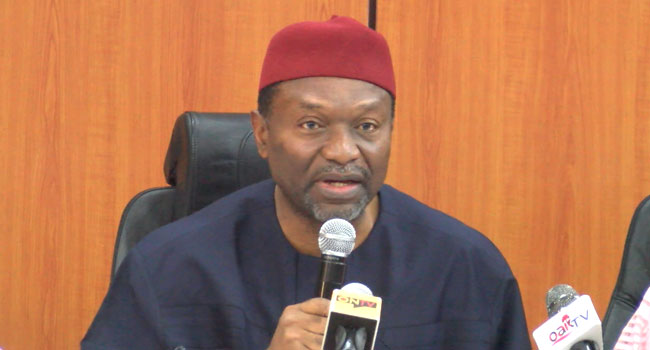CHANNELS TV
The proposed plan to sell off some of Nigeria’s national asset is not a welcome idea for many Nigerians.
One of such is the Chairman, Senate Committee on Power Steel Development and Metallurgy, Enyinnaya Abaribe, who believes such plan is as good as putting the country in the hands of a few people.
He expressed fears that proceeds from sold assets could be frittered away, putting the nation in a direr situation.
Lack Of Confidence
Mr Abaribe was speaking on Channels Television’s breakfast programme Sunrise Daily on Monday.
“The fear is; assuming you sell everything and it comes in and goes out in the same process without affecting the real sector which is the manufacturing sector, where will you be?
“That is why you see divided opinions in the Senate among those who contributed to the debate on the assets’ sale proposal.
“They say, there are several ways that you can reflate an economy and not just by one set of policy.
“There is a lack of confidence in the economy today and once there is no confidence in the economy, you will find someone that wants to find a safe haven,” Senator Abaribe pointed out.
He stressed the need for the government to bring back the people’s confidence.
Also speaking on the issue of assets sale, an energy economist, Mr Onuoha Nnaji, has challenged the government to come up with better strategies to reverse the current recession.
In his view, the government should think of ways of keeping oil production at benchmark levels by working with the Niger Delta militants regarding the protection of the oil facilities.
The Senate President, Dr. Bukola Saraki, had at a plenary asked the executive to raise capital from the sale of government assets and other sources to shore up reserves.
Senator Saraki made the recommendation as the Senate resumed plenary after a seven weeks’ recess.
Addressing lawmakers, Senator Saraki said that the sale of assets would calm investors, discourage currency speculation and stabilise the economy.
After the Senate President made the proposal, the National Economic Council approved President Muhammadu Buhari’s strategies to pull the economy out of recession.
This was done during its meeting in Abuja, chaired by the Vice President, Professor Yemi Osinbajo on September 22.
The council of ministers and governors debriefed the Finance Minister, Mrs Kemi Adeosun and the Minister of Budget and National Planning, Mr Udoma Udo Udoma as well as the CBN Governor, Godwin Emefiele on the strategies to take the country out of the woods.
Briefing State House correspondents after the closed-door meeting, the Deputy Governor of Ogun State, Yetunde Onanuga, said that the Central Bank would henceforth adopt best options to manage the situation.
Fiscal Stimulus Plan
The plan triggered mixed reactions which the Minister of Budget and National Planning tried to address in a statement.

Senator Udo Udoma, said that the primary objective of government’s fiscal stimulus plan was not to sell off all major critical national assets but to source immediate funds to reflate the economy and implement capital projects in the 2016 budget.
Senator Udoma gave the explanation in Lagos at the weekend while briefing reporters on the forthcoming Nigerian Economic Summit.
He said the intention of the government was just to get enough money to fund the 2016 budget and get the economy back on the path of recovery.
Government, he stated, needed to inject a large dose of funds into the system to get the economy back on track and to faithfully implement the provisions in the capital budget tailored at reflating the economy and aiding the diversification process.
Senator Udoma further explained that the country had lost almost half its expected revenue and would need to urgently source for the shortfall to enable the government faithfully implement the budget.
“This unfortunate scenario prompted the Economic Management Team to urgently work out a fiscal stimulus plan to generate immediate large injection of funds into the economy through asset sales, advance payment for license rounds, infrastructure concessioning, use of recovered funds, among others, to reduce the funding gap.
“The other option would have been to source for additional loans, beyond the level of borrowing already projected for in the 2016 Budget.
“This would not be a wise option as it would raise the level of debt service to an unsustainable level.” a statement by the Minister’s spokesman, Akpandem James, read.
Economy In Recession
Nigeria’s economy slid into recession, triggered by the drop in the price of crude which was compounded by resurgence of militancy in the Niger Delta region.
Gross Domestic Product (GDP) was contracted by 2.06% in the second quarter of 2016, a report by the National Bureau of Statistics showed.
According to the report, the decline has caused the Naira to get weaker while lower oil prices dragged the oil sector down.
The output shrunk by 0.36 in the first quarter.
During the quarter, nominal GDP was 2.73% higher at 23.48 million Naira at basic prices.
The nation’s economic situation became worse, as several oil facilities got destroyed.
These attacks on oil installations dipped production output by over 700,000 barrels per day (bpd) to 1.56 million bpd in the last few months, according to the nation’s Minister of Information, Mr Lai Mohammed.
A group that calls itself the Niger Delta Avengers has claimed responsibility for most of the attacks that have forced some oil companies in the region to declare force majeure.
The group, which few weeks ago said it had agreed to a ceasefire and was open to negotiations with the Federal government, launched another attack on an oil facility last week.
The Niger Delta Avengers said it was a warning to the government to cease the harassment of youths in the oil-rich nation.
No comments:
Post a Comment